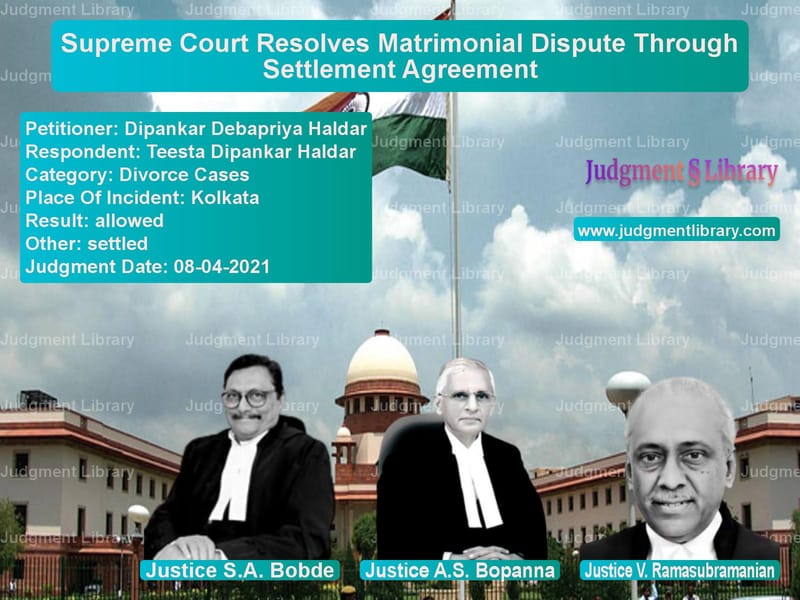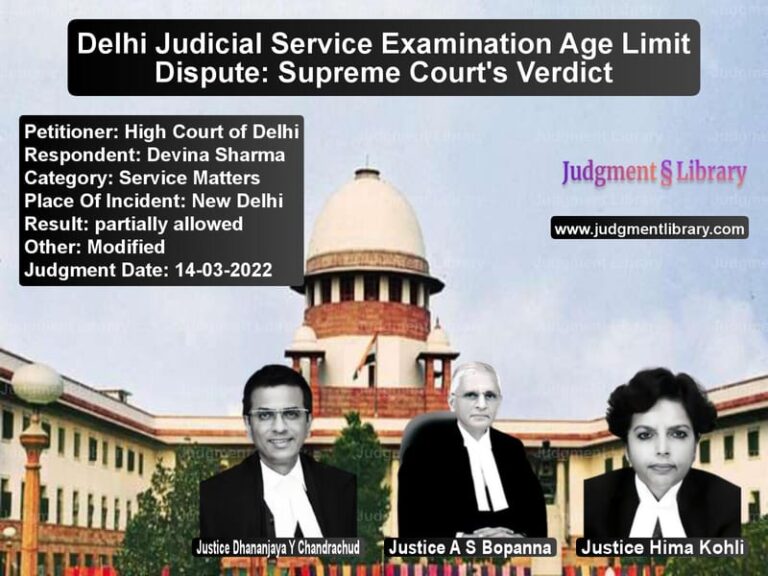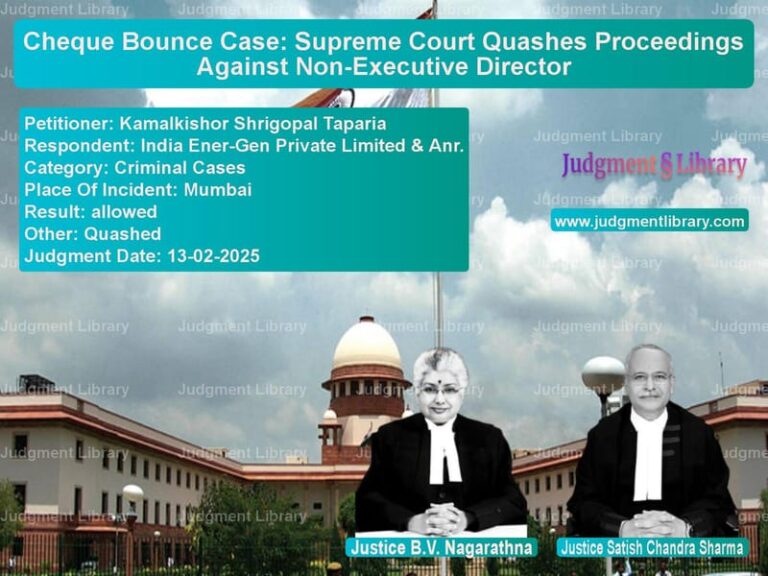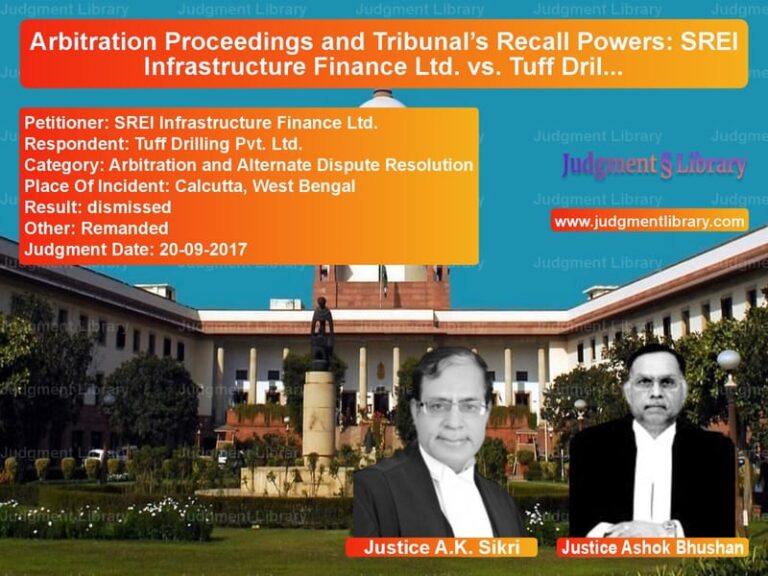Supreme Court Resolves Matrimonial Dispute Through Settlement Agreement
The Supreme Court of India recently adjudicated on a matrimonial dispute in the case of Dipankar Debapriya Haldar v. Teesta Dipankar Haldar. The case was related to a transfer petition filed by the petitioner-husband seeking the transfer of a divorce petition from Kolkata to New Delhi. Instead of engaging in prolonged litigation, the Supreme Court referred the matter to mediation, resulting in a settlement agreement between the parties.
Background of the Case
The petitioner, Dipankar Debapriya Haldar, filed a transfer petition seeking the transfer of Matrimonial Case No. 67 of 2013 from the Additional District Judge, 6th Court, Alipore, Kolkata, to a competent court in New Delhi. The dispute arose from his marriage with the respondent, Teesta Dipankar Haldar, solemnized on November 26, 1993. Due to differences, the couple started living separately from January 22, 2012. They also had a son, Indrajeet Haldar, who had attained majority at the time of the proceedings.
The Supreme Court initially issued notice on March 1, 2019, solely for the purpose of referring the case to mediation. Following multiple mediation sessions, the parties reached a mutual settlement agreement.
Key Terms of the Settlement Agreement
The settlement agreement covered multiple aspects, including the divorce proceedings, withdrawal of legal cases, division of properties, and financial agreements. The primary terms of the agreement were:
- Mutual Consent Divorce: The parties agreed to file for a divorce by mutual consent under Article 142 of the Constitution of India.
- Withdrawal of Cases: Both parties agreed to withdraw all pending civil and criminal cases, including police complaints.
- Property Settlement:
- The petitioner agreed to withdraw Title Suit No. 17 of 2017 concerning a property at Kanchan Towers, Navi Mumbai.
- The respondent agreed to relinquish her share in the property at Neel Splendor, Mumbai, with the petitioner bearing all associated costs.
- Bank and Financial Agreements:
- The parties agreed to close all joint bank accounts and lockers.
- The respondent agreed to have her name removed from Axis Bank and Dena Bank lockers.
- Furniture and Personal Belongings: The respondent was allowed to take back certain furniture and valuables.
- No Further Claims: Both parties agreed that they would not initiate any further litigation against each other.
Arguments by the Petitioner (Dipankar Debapriya Haldar)
- “The continued litigation has caused undue stress, and both parties should amicably resolve their differences through a mutual settlement.”
- “A divorce by mutual consent would be in the best interest of both individuals, considering their prolonged separation.”
- “All property and financial disputes should be resolved to prevent any future litigation.”
Arguments by the Respondent (Teesta Dipankar Haldar)
- “The dispute should be settled amicably to ensure that both parties move forward with dignity and without legal burdens.”
- “The division of property and financial matters should be fairly addressed to ensure both parties’ rights are protected.”
- “Mutual withdrawal of cases will help prevent unnecessary legal expenses and delays.”
Supreme Court’s Observations
The Supreme Court took cognizance of the settlement agreement and emphasized the importance of mediation in resolving matrimonial disputes. The Court observed:
- “Mediation plays a crucial role in reducing the burden of matrimonial disputes on courts and helps parties reach amicable settlements.”
- “When both parties voluntarily agree to a settlement, it is in their best interests to avoid prolonged litigation.”
- “The terms of the settlement agreement appear to be fair and reasonable, covering all major aspects of their dispute.”
Final Order of the Supreme Court
1. The petition was disposed of in accordance with the settlement agreement.
2. The parties were directed to file for mutual consent divorce in an appropriate Kolkata court.
3. The Title Suit No. 17 of 2017 filed by the petitioner was dismissed as withdrawn.
4. The petitioner was directed to facilitate the release of title documents for the Kanchan Towers property to the respondent.
5. The respondent was directed to relinquish her share in the Neel Splendor property.
6. The parties were ordered to close all joint bank accounts and resolve financial matters as per the settlement agreement.
7. The furniture and personal belongings of the respondent were to be handed over as agreed.
8. Both parties were instructed not to initiate any further litigation related to their marriage.
Implications of the Judgment
This ruling highlights the effectiveness of mediation in matrimonial disputes. The case sets an example for:
- Encouraging couples to opt for mediation instead of prolonged court battles.
- Providing a structured approach to resolving financial and property disputes in divorce cases.
- Reducing the burden on courts by resolving family matters amicably.
Conclusion
The Supreme Court’s decision in Dipankar Debapriya Haldar v. Teesta Dipankar Haldar demonstrates the importance of mediation in matrimonial disputes. By ensuring an amicable settlement, the Court facilitated a dignified and peaceful resolution for both parties. The judgment reaffirms the significance of mutual consent divorce and out-of-court settlements in reducing unnecessary litigation.
Petitioner Name: Dipankar Debapriya Haldar.Respondent Name: Teesta Dipankar Haldar.Judgment By: Justice S.A. Bobde, Justice A.S. Bopanna, Justice V. Ramasubramanian.Place Of Incident: Kolkata.Judgment Date: 08-04-2021.
Don’t miss out on the full details! Download the complete judgment in PDF format below and gain valuable insights instantly!
Download Judgment: dipankar-debapriya-h-vs-teesta-dipankar-hald-supreme-court-of-india-judgment-dated-08-04-2021.pdf
Directly Download Judgment: Directly download this Judgment
See all petitions in Mutual Consent Divorce
See all petitions in Property Division in Divorce Cases
See all petitions in Judgment by S. A. Bobde
See all petitions in Judgment by A. S. Bopanna
See all petitions in Judgment by V. Ramasubramanian
See all petitions in allowed
See all petitions in settled
See all petitions in supreme court of India judgments April 2021
See all petitions in 2021 judgments
See all posts in Divorce Cases Category
See all allowed petitions in Divorce Cases Category
See all Dismissed petitions in Divorce Cases Category
See all partially allowed petitions in Divorce Cases Category







